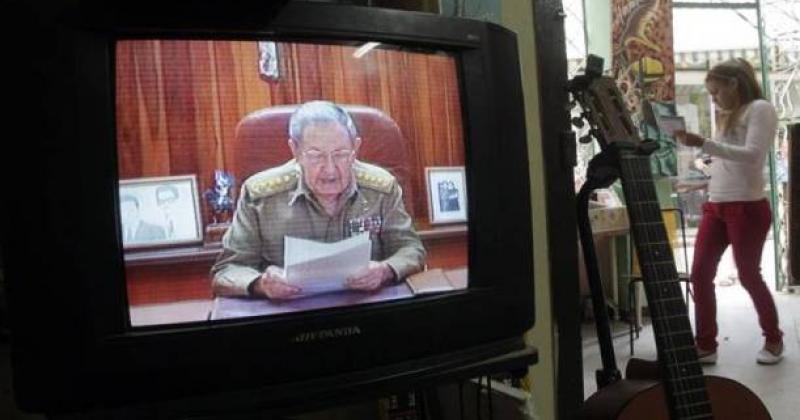US President Barack Obama and the President of Cuba Raúl Castro have mentioned the crucial role played by the Latin American Pope in achieving a landmark deal between the two countries. Maduro called it a “wonderful gift” on the occasion of Francis’ birthday. The meetings between Kerry and Parolin which preceded the diplomatic breakthrough.
“The Holy Father wishes to express his warm congratulations for the historic decision taken by the Governments of the United States of America and Cuba to establish diplomatic relations, with the aim of overcoming, in the interest of the citizens of both countries, the difficulties which have marked their recent history.” Shortly after Barack Obama and Raúl Castro concluded their conversation, broadcast live on television, the Vatican Secretariat of State issued a statement in Italian, English and Spanish.
The statement confirms the news that “in recent months, Pope Francis wrote letters to the President of the Republic of Cuba, His Excellency Mr Raúl Castro, and the President of the United States, The Honorable Barack H. Obama, and invited them to resolve humanitarian questions of common interest, including the situation of certain prisoners, in order to initiate a new phase in relations between the two Parties.” “The Holy See,” the statement reveals, “received Delegations of the two countries in the Vatican last October and provided its good offices to facilitate a constructive dialogue on delicate matters, resulting in solutions acceptable to both Parties.” “The Holy See,” the Secretariat of State’s message concludes, “will continue to assure its support for initiatives which both nations will undertake to strengthen their bilateral relations and promote the wellbeing of their respective citizens.”
In their speeches, both Obama and Castro make explicit reference to the instrumental role the Argentinean Pope played in bringing about the historic thaw in relations between two countries that have been at loggerheads with one another since Fidel Castro seized power in January 1959 through a Marxist revolution, just a few kilometres from the US coast. President Obama wished to thank Pope Francis “in particular”, “for [trying to make the world] as it should be, instead of accepting it as it is.” Instants later, Argentina’s President Cristina Kirchner and her counterparts, Bolivia’s Evo Morales and Venezuela’s Nicolas Maduro, who were attending a meeting of Latin American leaders, praised the Pope for the role he played: the Venezuelan President emphasised Francis’ identity as a “Latin American Pope, our Pope”, pointing out that this historic turnaround in US-Cuba relations is a “wonderful present” for Francis to receive on his 78th birthday (celebrated on 17 December).
Presidents Obama and Castro confirmed that the Pope issued a “personal appeal” to both leaders, urging them to resolve the Alan Gross case – the USAID contractor was released this 17 December after five years in prison – and those of three Cuban agents who had been held in the US for 15 years. Francis’ letter, which is part of a broader Vatican initiative, “gave us greater impetus and momentum for us to move forward,” a senior Obama administration official revealed to reporters in Washington, just minutes before Obama and Castro’s simultaneous press conferences.
The Holy See has always kept a close eye on the Cuban situation. Previous papal efforts to mend US-Cuban relations include John XXIII’s role in the resolution of the Cuban missile crisis, John Paul II’s visit to the island in 1998 and Benedict’s visit in 2012. Both met Fidel Castro (who was taught by Jesuits in his youth) but Joseph Ratzinger was accompanied every step of the way by Fidel’s brother Raúl who became President of Cuba in 2008. Furthermore, the Vatican’s then Secretary of State, Cardinal Tarcisio Bertone – who personally visited the island – had already paved the way for Benedict XVI’s trip, thanks to the contact he had maintained with Cuba over time. Others who helped pave the way for Ratzinger’s visit were Bertone’s two deputies: the now outgoing Secretary for Relations with States, Dominique Mamberti - who visited the Caribbean island at the time - and his “substitute”, Mgr. Angelo Becciu, who was Apostolic Nuncio to Cuba. In those years Spain’s former minister for foreign affairs, Miguel Angel Moratinos, visited the Vatican to discuss potential diplomatic mediation to allow the release of political dissidents detained in Cuba.
Speedier progress in relations came with the election of the first ever Latin American Pope to the Chair of Peter. The man who published the notes made by the then Archbishop of Buenos Aires in the days prior to the Conclave (for a speech that was to prove decisive in his selection as a candidate for the papacy), was the Archbishop of Havana, Jaime Lucas Ortega. This gives an indication of how intense relations were. In recent years, an increasingly important role in the Castro establishment, has been played by Havana City Historian Eusebio Leal Spengler, a Catholic. Furthermore, for the first time in thirty years, the US has a Catholic Secretary of State, John Kerry. Last January, he went to Rome especially to meet the new Vatican Secretary of State, Cardinal Pietro Parolin. The Holy See did not mention Cuba among the issues the two discussed during their encounter, but in a press conference held in Rome after the meeting took place, the head of US diplomacy himself, explained that he had “raised the issue of Alan Gross and his captivity,” adding that he “hope[d] very much that there might be able to be assistance with respect to that issue.” 12 months later (last Monday), John Kerry visited Parolin again. The Vatican mentioned Cuba’s Guantanamo detention facility for suspected terrorists among the issues looked at. But there was no specific reference to Cuba itself on this occasion either. The diplomatic breakthrough was to be announced to the world by Barack Obama and Raúl Castro on the evening of 17 December.
